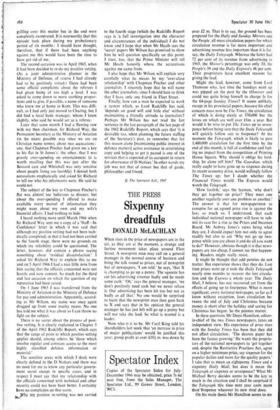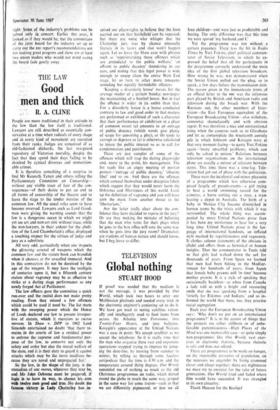Sixpenny dreadfuls
THE PRESS DONALD McLACHLAN
When rises in the price of newspapers are in the air, as they are at the moment, a strange and furtive movement takes place around Fleet Street. A newsprint man may call on a general manager in the normal course of business and bring the talk round to prices, not of newsprint but of newspapers. 'I am told,' he says, 'that X is champing to go up a penny. The squeeze has cut his advertising revenue badly and he needs some cash.' Oh,' says the general manager, 'we don't positively need cash but we never refuse it. Our advertising has been hit too but not as badly as all that.' No one would be surprised to learn that the newsprint man then goes back to X and says that in his opinion the general manager he has just left will go up a penny but will not take the lead. So what is wanted is a leader.
Now who is it to be. Mr Cecil King told his shareholders last week that 'an increase in price of major publications' would be justified this year; group profit at over £10+ m. was down by
over £2 m. That is to say, the ground has been prepared for the Daily and Sunday Mirrors and the People, all mass circulation papers for which circulation revenue is far more important and advertising revenue less important than it is for, say, the Daily Telegraph. Whereas the latter had 72 per cent of its revenue from advertising in 1965, the Mirror's percentage was only 33, the People's 39 and the Daily Express's 46 per cent. Their proprietors have excellent reasons for giving the lead.
Might the lead, however, come from Lord Thomson who, last time the Sundays went up was pipped on the post by the Observer and could not quite bring himself to charge Is for the 64-page Sunday Times? It seems unlikely, except in his provincial papers, because his chief concern must now be The Times, the circulation of which- is doing nicely at 370,000 but the losses on which are well over £1m. a year. But would it be wise to put The Times up to seven- pence before being sure that the Daily Telegraph will quickly follow suit to fivepence? At the moment the Telegraph, which is likely to pass 1,400,000 circulation for the first time by the end of this month, is full of confidence and feel- ing no impact from the competition of Printing House Square. Why should it oblige his lord- ship, let alone tell him? The Guardian, which really ought to have gone up to sixpence during its recent economy drive, would willingly follow The Times up; but I doubt whether the Financial Times would. The Express would watch the Telegraph.
'How foolish,' says the layman, 'why don't they get together on price? They meet one another regularly over one problem or another.' The answer is that for newspapermen to conspire for an agreed price rise is against the law; so much so, I understand, that each individual national newspaper will have to sub- mit its case for a rise to the Prices and Incomes Board. Mr Aubrey Jones's views being what they are, I should expect him not only to agree readily but also to ask 'Why not go up two- pence while you are about it and do all you want to do?' However, obvious though it is that news- papers are too cheap, I cannot see that happen- ing. Readers might really resist.
It might be thought that odd pennies do not matter. But experience shows that they do. Last time prices went up it took the Daily Telegraph nearly nine months to recover the lost circula- tion and the Express a whole year. The Daily Mail, I believe, has not recovered yet from the effects of going up to fourpence. What is more significant, every national newspaper, so far as I know without exception, loses circulation be- tween the end of July and Christmas because money is short after the holiday and saving for Christmas has begun. So the pennies matter.
In these questions Mr Denis Hamilton, editor- in-chief of the two Times newspapers, takes an independent view. His experience of price rises with the Sunday Times has been that they did not affect circulation: 'The dearest paper has been the fastest growing.' He wants the proprie- tors of the national newspapers to 'get together and, despite the Restrictive Practices Act, agree on a higher minimum price, say sixpence for the popular dailies and more for the quality papers.' I take that to mean an eightpenny Times and a sixpenny Daily Mail; but does it mean the Telegraph at sixpence or sevenpence? What Mr Michael Berry decides seems to be the key to much in the situation and I shall be surprised if the Telegraph this time next year costs more than' fivepence whatever its new rival does.
On his main thesis Mr Hamilton seems to me
right. Some of the industry's problems can, be solved only in. concert. Earlier this .year, it looked as if they would be; but the committees of the joint board for the industry set up to carry oqt the Ent report's recommendations are not making great progress and there are at least two.union leaders who would not mind seeing the board fade gently away.











































 Previous page
Previous page